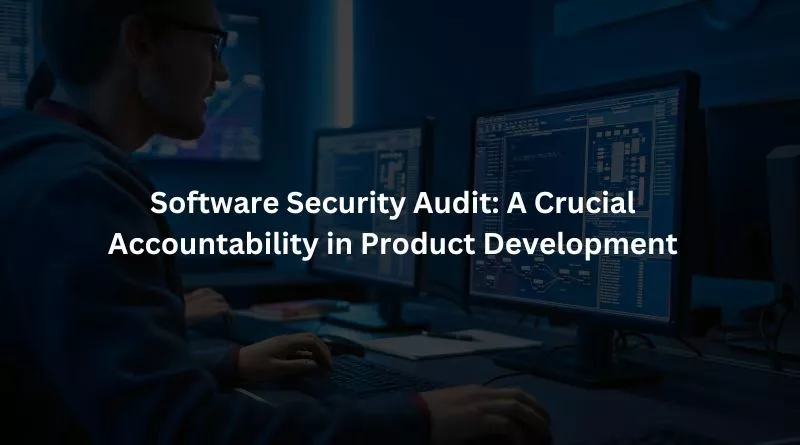In an interconnected digital era where cyber threats are increasingly sophisticated, a software security audit is no longer an option – it’s an absolute necessity. As a cyber consulting company, SoftSeq is often asked, “Who should be responsible for the security of our product?” While many believe that product security is everyone’s responsibility, this mindset can lead to a dangerous grey area where responsibility is diluted, and important security tasks are overlooked.
If everyone is responsible, then ironically, no one is.
Many organizations fall into the trap of assuming that their team, being savvy and experienced, will naturally safeguard their product. This often stems from a false sense of security – the belief that their team is too smart to allow any breaches. This kind of mentality not only underestimates the complexity and cunning of modern cyber threats but also overlooks the importance of specialized roles and services like a software security audit.
Why is a Software Security Audit So Important?
A software security audit offers a detailed, systematic evaluation of your software’s security by identifying potential vulnerabilities and assessing the level of risk they pose. It’s a specialized role that requires deep knowledge in the field of cybersecurity.
The audit serves as a rigorous stress test against various threat scenarios. It validates your existing security measures and sheds light on any areas of weakness. With the report, you can prioritize fixes and strengthen your overall security posture.
Conducting regular software security audits is crucial for any development company for several reasons:
- Protection from Breaches: A software security audit identifies vulnerabilities before they can be exploited, thus shielding your reputation, data, and financial resources from potentially devastating breaches.
- Regulatory Compliance: Audits ensure that your software complies with global cybersecurity standards and regulations, keeping you legally protected.
- Trust-Building: Regular audits demonstrate your commitment to security, fostering trust among your clients and stakeholders.
Common Challenges Faced by Software Auditors?
Some of the common challenges faced by software auditors are:
Software audit virtualization: The use of virtual machines, containers, cloud services, and other technologies to run software systems and applications adds layers of abstraction and complexity to the audit process. Auditors need to have access to the underlying infrastructure and configuration of these environments to perform a thorough audit.
Software audit data collection and analysis errors:
The process of collecting and analyzing data from various sources, such as logs, databases, code repositories, etc., can be prone to errors, inconsistencies, inaccuracies, and biases. Auditors need to use reliable tools and methods to ensure the validity and integrity of the data they use for the audit.
Software environment designations:
The different environments where software systems and applications are developed, tested, deployed, and operated can have different security requirements and risks. Auditors need to understand the purpose and scope of each environment and apply appropriate audit criteria and controls accordingly.
Indirect access and multiplexing:
The use of intermediaries or agents to access or interact with software systems and applications can obscure or alter the identity and activity of the end users. Auditors need to be able to trace and verify the source and destination of each request or transaction to ensure accountability and compliance.
Software audit extrapolated findings:
The use of statistical methods or assumptions to infer or estimate the findings or conclusions from a sample or subset of data can lead to inaccurate or misleading results. Auditors need to use sufficient and representative data sets to perform a comprehensive and accurate audit.
Convoluted metrics and software licensing changes:
The use of complex or ambiguous metrics or criteria to measure or evaluate the security performance or compliance of software systems and applications can create confusion or disagreement among stakeholders. Auditors need to use clear and consistent metrics or criteria that align with the objectives and expectations of the organization.
Pirated software licenses:
The use of unauthorized or counterfeit copies or versions of software systems or applications can expose the organization to legal risks as well as security risks. Auditors need to verify the authenticity and legitimacy of each software license used by the organization.
As you can see, conducting a software security audit is not a trivial matter. It requires a lot of knowledge, skills, tools, time, and resources. That’s why many development companies struggle with it or neglect it altogether.
Why SoftSeq?
At SoftSeq, we comprise a team of seasoned software security engineers who understand the intricacies of digital threats. Our software security audits delve deep into your systems, scrutinizing every possible vulnerability. We are not developers, but specialists who bridge the gap between development and security.
Our team doesn’t just identify vulnerabilities; we provide actionable insights and recommendations to bolster your defenses, ensuring that you’re not just compliant but truly secure. Moreover, we offer tailored training to upskill your team in the latest security practices.
As the saying goes, “Prevention is better than cure.” Software security audits are the preventive measure that every development company needs to ensure a truly secure product. Investing in specialized cyber consulting services, such as those offered by SoftSeq, adds a robust layer of defence to your software development life cycle.
Remember, if everyone is responsible for your product’s security, then nobody is. Define the roles, make them accountable, and never underestimate the importance of a professional software security audit.

